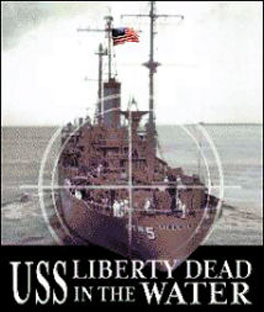 Navy Times: Telegrams Cast Doubt on USS Liberty Report
Navy Times: Telegrams Cast Doubt on USS Liberty Report
By Bryant Jordan
Forty years ago this month Israeli warplanes and torpedo boats strafed the U.S. Navy intelligence ship Liberty with machine gun fire, hit it with torpedoes and blasted it with napalm, killing 34 U.S. sailors and wounding 174 more.
But the Liberty did not go down after the June 8, 1967, attack. And though sold for scrap more than three decades ago, it still refuses to sink into history, as surviving crew members long critics of the Navy board of inquiry’s conclusion that the incident was an error continue to push for a complete investigation.
Alternative theories have persisted about the incident, ranging from allegations that the Israelis deliberately struck the Liberty to a belief that Israeli and American leaders colluded on the attack, initially hoping to pin it on Egypt.
Now attack survivors, who will meet this month in Washington for a reunion, may have something new with which to poke holes in the Navy board’s finding: copies of the first Western Union telegrams notifying next of kin of a family member’s death.
Premature conclusion?
In each of 25 telegrams seen by Navy Times, the Navy was calling the attack an accident well before its court of inquiry ever convened. The telegrams are dated as early as June 9 some four days before the official board heard from a single Liberty witness and June 13, two days before the board finished its report.
In the telegrams, housed in Navy personnel files at the National Archives facility in College Park, Md., the Navy states that the deaths occurred “when the USS Liberty was accidentally attacked by Israeli forces.”
Reports of Casualty, known as DD 1300 forms, acquired on six Liberty crewmen also call the attack accidental or mistaken, and categorize the deaths as “non-battle.”
Three of the six are dated before the board of inquiry reached its findings on June 15, and three are dated afterward.
Jack Green of the Naval Historical Center believes that Navy had no choice but to call the deaths accidental, even before any investigation was completed.
“Accident and killed in action are legal terms, and so it would be my guess that because the United States was not in a state of war with Israel, you couldn’t be given a classification of killed in action or wounded in action,” he said.
Green said the crew could not be labeled “killed in action” then because not all the facts were in, and “extreme caution” must be exercised that any information furnished is consistent with the facts.
“If further investigation shows something else, you would redo that finding,” he said.
Some of the telegrams bear a typed signature line for then-Chief of Naval Personnel Vice Adm. B.J. Semmes Jr.
“I’m sure [Semmes] would have consulted with the higher levels of the Navy, because this was a very newsworthy, very prominent event at the time. This would have been well thought out,” Green said.
James R. Gotcher, a former general counsel to the Liberty Veterans Association, called the telegrams “further evidence that there was undue command influence in the structuring and conduct of the court of inquiry, and that the political decision had been made to cover this up within hours of the attack.”
He said Green’s suggestion “is certainly plausible … but you don’t really go beyond your brief on what you’re supposed to [say], especially on something as sensitive as this.
“While it’s plausible somebody would put that in [the telegrams] I can’t think of a reason why they would. If you don’t know that it is an accident, what happens then if you have to come back and say, no, it was a deliberate attack?”
Gotcher was an Air Force intelligence analyst assigned to Da Nang, Vietnam, in 1967, and said he saw the original military message traffic on the Liberty assault and that it showed the attack was deliberate. He has provided his own testimony to the Liberty association for its efforts to get the attack investigated, and also helped the group draft a war crimes report in 2005, which it submitted to the Pentagon.
The Defense Department decided against pursuing the Liberty group’s report, said James Ennes, a surviving officer of the Liberty and the author of “Assault on the Liberty.”
Ennes said the crew had hoped to have someone from the Navy speak to members at the reunion about how they handled the report, but the request was turned down.
Article Source: NavyTimes.com
Also Vist: USSLiberty.org
Survivors of USS Liberty Attack Want Answers
Podcast: Play in new window | Download





